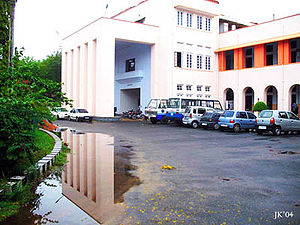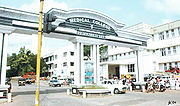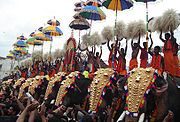Kerala's healthcare system has garnered international acclaim. The state has a very good medical facility. The United Nations Children's Fund (UNICEF) and the World Health Organization designated Kerala the world's first "baby-friendly state" because of its effective promotion of breast-feeding over formulas. For example, more than 95% of Keralite births are hospital-delivered. Aside from ayurveda (both elite and popular forms), siddha, and unani, many endangered and endemic modes of traditional medicine, including kalari, marmachikitsa, and vishavaidyam, are practiced. These propagate via gurukula discipleship, and comprise a fusion of both medicinal and supernatural treatments, and are partly responsible for drawing increasing numbers of medical tourists.
 A steadily aging population (11.2% of Keralites are over age 60) and low birthrate (18 per 1,000) make Kerala one of the few regions of the Third World to have undergone the "demographic transition" characteristic of such developed nations as Canada, Japan, and Norway. In 1991, Kerala's total fertility rate (children born per women) was the lowest in India. Hindus had a TFR of 1.66, Christians 1.78, and Muslims 2.97. Kerala's female-to-male ratio (1.058) is significantly higher than that of the rest of India. The same is true of its sub-replacement fertility level and infant mortality rate (estimated at 12 to 14 deaths per 1,000 live births). A steadily aging population (11.2% of Keralites are over age 60) and low birthrate (18 per 1,000) make Kerala one of the few regions of the Third World to have undergone the "demographic transition" characteristic of such developed nations as Canada, Japan, and Norway. In 1991, Kerala's total fertility rate (children born per women) was the lowest in India. Hindus had a TFR of 1.66, Christians 1.78, and Muslims 2.97. Kerala's female-to-male ratio (1.058) is significantly higher than that of the rest of India. The same is true of its sub-replacement fertility level and infant mortality rate (estimated at 12 to 14 deaths per 1,000 live births).
However, Kerala's morbidity rate is higher than that of any other Indian state - 118 (rural Keralites) and 88 (urban) per 1,000 people. The corresponding all India figures are 55 and 54 per 1,000, respectively. Kerala's 13.3% prevalence of low birth weight is substantially higher than that of First World nations. Outbreaks of water-borne diseases such as diarrhoea, dysentery, hepatitis, and typhoid among the more than 50% of Keralites who rely on 3 million water wells is a problem worsened by the widespread lack of sewers.
 Trivandrum Medical College is located in Thiruvananthapuram city, the capital of Kerala state, India. It was founded in 1951, and was inaugurated by Jawaharlal Nehru, the first prime minister of India. This is the oldest and most prestigious medical college in Kerala. It is being upgraded to the status of an All India Institute of Medical Sciences (AIIMS). The medical college campus also possess several other hospitals and institutions like the College of Nursing, Regional Cancer Centre, Trivandrum Dental College, Sree Chitra Thirunal Institute of Medical Sciences and Technology, Priyadarshini Institute of Paramedical Sciences, Sree Avittam Thirunal Hospital for women and children etc; working in it. Trivandrum Medical College is located in Thiruvananthapuram city, the capital of Kerala state, India. It was founded in 1951, and was inaugurated by Jawaharlal Nehru, the first prime minister of India. This is the oldest and most prestigious medical college in Kerala. It is being upgraded to the status of an All India Institute of Medical Sciences (AIIMS). The medical college campus also possess several other hospitals and institutions like the College of Nursing, Regional Cancer Centre, Trivandrum Dental College, Sree Chitra Thirunal Institute of Medical Sciences and Technology, Priyadarshini Institute of Paramedical Sciences, Sree Avittam Thirunal Hospital for women and children etc; working in it.
Major Institutions and units under Medical College, Thiruvananthapuram are as follows:-
- Medical College
- Teaching Departments
- Medical College Hospital
- Sree Avittom Thirunal Hospital
- Ophthalmic Hospital
- Medical College Health Unit,Pangappara
- Dental College
- College of Pharmaceutical Sciences
- Priyadarsini Institute of Para Medical Sciences
- College of Nursing
- Regional Artificial Limb Fitting Centre
- Central Library
- Central Workshop
- Animal House
|
 A steadily aging population (11.2% of Keralites are over age 60) and low birthrate (18 per 1,000) make Kerala one of the few regions of the Third World to have undergone the "demographic transition" characteristic of such developed nations as Canada, Japan, and Norway. In 1991, Kerala's total fertility rate (children born per women) was the lowest in India. Hindus had a TFR of 1.66, Christians 1.78, and Muslims 2.97. Kerala's female-to-male ratio (1.058) is significantly higher than that of the rest of India. The same is true of its sub-replacement fertility level and infant mortality rate (estimated at 12 to 14 deaths per 1,000 live births).
A steadily aging population (11.2% of Keralites are over age 60) and low birthrate (18 per 1,000) make Kerala one of the few regions of the Third World to have undergone the "demographic transition" characteristic of such developed nations as Canada, Japan, and Norway. In 1991, Kerala's total fertility rate (children born per women) was the lowest in India. Hindus had a TFR of 1.66, Christians 1.78, and Muslims 2.97. Kerala's female-to-male ratio (1.058) is significantly higher than that of the rest of India. The same is true of its sub-replacement fertility level and infant mortality rate (estimated at 12 to 14 deaths per 1,000 live births). Trivandrum Medical College is located in Thiruvananthapuram city, the capital of Kerala state, India. It was founded in 1951, and was inaugurated by Jawaharlal Nehru, the first prime minister of India. This is the oldest and most prestigious medical college in Kerala. It is being upgraded to the status of an All India Institute of Medical Sciences (AIIMS). The medical college campus also possess several other hospitals and institutions like the College of Nursing, Regional Cancer Centre, Trivandrum Dental College, Sree Chitra Thirunal Institute of Medical Sciences and Technology, Priyadarshini Institute of Paramedical Sciences, Sree Avittam Thirunal Hospital for women and children etc; working in it.
Trivandrum Medical College is located in Thiruvananthapuram city, the capital of Kerala state, India. It was founded in 1951, and was inaugurated by Jawaharlal Nehru, the first prime minister of India. This is the oldest and most prestigious medical college in Kerala. It is being upgraded to the status of an All India Institute of Medical Sciences (AIIMS). The medical college campus also possess several other hospitals and institutions like the College of Nursing, Regional Cancer Centre, Trivandrum Dental College, Sree Chitra Thirunal Institute of Medical Sciences and Technology, Priyadarshini Institute of Paramedical Sciences, Sree Avittam Thirunal Hospital for women and children etc; working in it.

